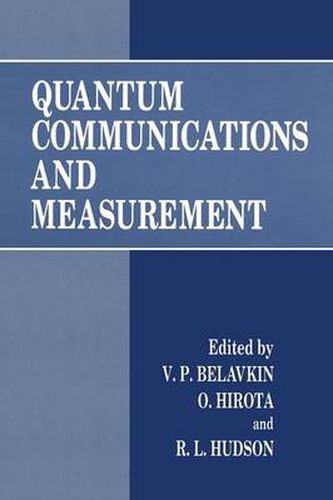Readings Newsletter
Become a Readings Member to make your shopping experience even easier.
Sign in or sign up for free!
You’re not far away from qualifying for FREE standard shipping within Australia
You’ve qualified for FREE standard shipping within Australia
The cart is loading…






This title is printed to order. This book may have been self-published. If so, we cannot guarantee the quality of the content. In the main most books will have gone through the editing process however some may not. We therefore suggest that you be aware of this before ordering this book. If in doubt check either the author or publisher’s details as we are unable to accept any returns unless they are faulty. Please contact us if you have any questions.
The International Workshop on Quantum Communications and Measurement was held at the University of Nottingham from July 10-16, 1994. It followed the successful meeting on Quantum Aspects of Optical Communications in Paris in November 1990. This time the conference was devoted to mathematical, physical and engineering aspects of quantum noise, signal processing and quantum informa tion in open systems, quantum channels, and optical communications. It brought research workers in the experimental and engineering aspects of quantum optics and communication systems into contact with theoreticians working in quantum probability and measurement theory. The workshop was attended by more than 130 participants from 22 different countries. The largest groups [after the UK (31)] were from Japan (19) and from Russia (14). The subjects discussed included the mathematical foundations of quantum communication systems, experiments and devices, the problem of collapse and continuous measurement, quantum input and output processes, causality and nondemolition observation, squeezed states, quan tum jumps, state diffusion and spontaneous localization, filtering and control in quantum systems, and new quantum optical phenomena and effects, including non classical light. These new mathematical and physical ideas were stimulated by recent advances in generation and detection of light with low quantum noise and the development of techniques for trapping a single atom over an extended period of time, making it possible to observe individual quantum phenomena at the macroscopic level.
$9.00 standard shipping within Australia
FREE standard shipping within Australia for orders over $100.00
Express & International shipping calculated at checkout
Stock availability can be subject to change without notice. We recommend calling the shop or contacting our online team to check availability of low stock items. Please see our Shopping Online page for more details.
This title is printed to order. This book may have been self-published. If so, we cannot guarantee the quality of the content. In the main most books will have gone through the editing process however some may not. We therefore suggest that you be aware of this before ordering this book. If in doubt check either the author or publisher’s details as we are unable to accept any returns unless they are faulty. Please contact us if you have any questions.
The International Workshop on Quantum Communications and Measurement was held at the University of Nottingham from July 10-16, 1994. It followed the successful meeting on Quantum Aspects of Optical Communications in Paris in November 1990. This time the conference was devoted to mathematical, physical and engineering aspects of quantum noise, signal processing and quantum informa tion in open systems, quantum channels, and optical communications. It brought research workers in the experimental and engineering aspects of quantum optics and communication systems into contact with theoreticians working in quantum probability and measurement theory. The workshop was attended by more than 130 participants from 22 different countries. The largest groups [after the UK (31)] were from Japan (19) and from Russia (14). The subjects discussed included the mathematical foundations of quantum communication systems, experiments and devices, the problem of collapse and continuous measurement, quantum input and output processes, causality and nondemolition observation, squeezed states, quan tum jumps, state diffusion and spontaneous localization, filtering and control in quantum systems, and new quantum optical phenomena and effects, including non classical light. These new mathematical and physical ideas were stimulated by recent advances in generation and detection of light with low quantum noise and the development of techniques for trapping a single atom over an extended period of time, making it possible to observe individual quantum phenomena at the macroscopic level.